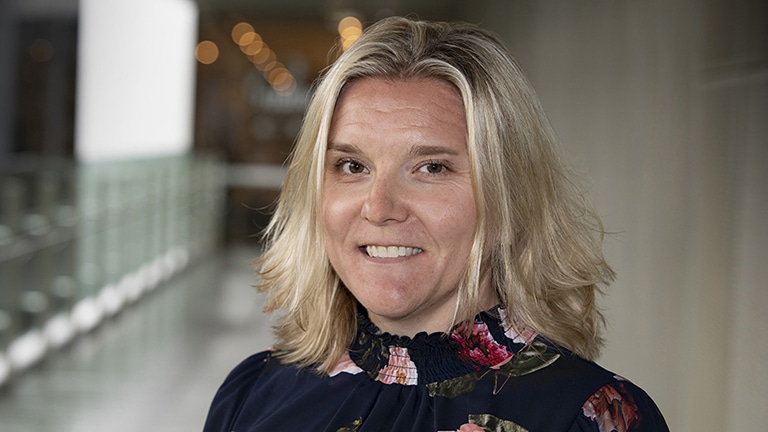
Stroke researcher Dr Heidi Janssen has received HMRI’s first Women in Medical Research Fellowship to help reconnect stroke survivors with the community.

Stroke researcher Dr Heidi Janssen has received the Hunter Medical Research Institute’s first Women in Medical Research Fellowship (WIMRF) to develop a unique, community-based rehabilitation project using activities such as singing, dancing and art to stimulate recovery.
As a physiotherapist, Dr Janssen works closely with health-care providers to help stroke survivors reconnect with their life prior to falling ill. Her early PhD research led to the creation of ‘enriched environments’ in a hospital setting, where patients could exercise and socialise.
This concept will now be taken into the community for the first time, thanks to the three-year, $285,000 fellowship provided by an anonymous HMRI donor. The project is titled Exercising, Socialising and Thinking – an Environment Enrichment Model in the community After Stroke (ESTEEM After Stroke).
“We’re trying to fill the gap that exists after people finish their rehabilitation journey in the health system, which can be relatively short for some patients,” Dr Janssen said.
“Whether they’ve experienced speech, balance, physical or sensory impairments, it can be difficult for people to live independently in the way they did before stroke. Often, they need more time to recover but they’ve got few places to go after returning home.”
The study will unite stroke survivors and their carers, health services and community groups to translate the research into sustainable practice.
“This project is something I’ve wanted to do for a very long time, so the Women in Medical Research Fellowship is hugely significant for me. It gives me more autonomy to build a research team and develop my skills as a researcher to effect real change in stroke rehabilitation,” Dr Janssen adds.
“We’ve seen in laboratory models that an enhanced environment improves brain plasticity [cellular reconnection] and assists recovery, while also improving the patient’s emotional well-being. We can now translate this into a real-world, community setting.”
The study’s initial phase will determine what activities the participants want, and what providers can offer in the collaboration. Centres will be established at different community venues, an example being The Place at Charlestown Square which Dr Janssen has identified as suitable.
HMRI introduced the WIMRF program to stem the ‘silent brain drain’ impacting female researchers at their critical mid-career juncture. Dr Janssen was selected as the inaugural recipient from a highly competitive field, based on the quality of her project.
“On behalf of HMRI and also our generous donor, I congratulate Heidi on her success,” HMRI Director Professor Tom Walley said. “We need to retain the best and brightest mid-career researchers, like Heidi, so they can produce results that will hopefully lead to better community health outcomes.”
Click here for further details on the Fellowship scheme
* Other HMRI-affiliated researchers working on the project include Professors Michael Nilsson, John Wiggers and Frini Karayanidis, Associate Professor Coralie English, and Dr Bernadette Matthias from the Stroke Choir. HMRI patron Jennie Thomas is the community representative. HMRI is a partnership between the University of Newcastle, Hunter New England Health and the community.
HMRI would like to acknowledge the Traditional Custodians of the land on which we work and live, the Awabakal and Worimi peoples, and pay our respects to Elders past and present. We recognise and respect their cultural heritage and beliefs and their continued connection to their land.

Hunter Medical Research Institute
We’re taking healthy further.
Locked Bag 1000
New Lambton
NSW, Australia, 2305



This site is protected by reCAPTCHA and the Google Privacy Policy and Terms of Service apply.
Copyright © 2024 Hunter Medical Research Institute | ABN: 27 081 436 919
Site by Marlin Communications
